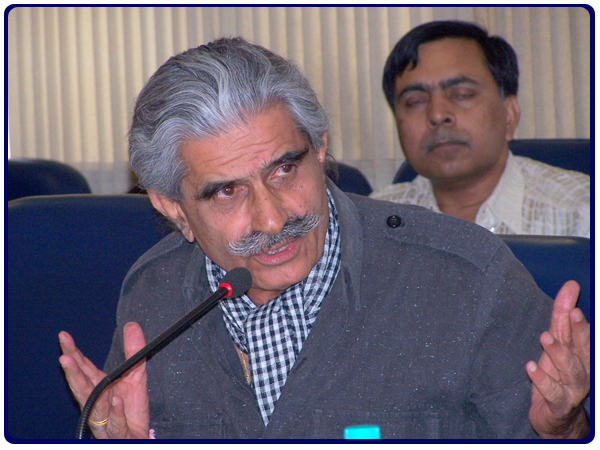Ilankai Tamil Sangam30th Year on the Web Association of Tamils of Sri Lanka in the USA |
||||
 Home Home Archives Archives |
Sri Lanka's Next BattlePolitical compromise should follow military victory.by Ashok K. Mehta, Asian Wall Street Journal, January 6, 2009
Could it be that Sri Lanka's quarter-century battle against a fierce insurgency is nearly over? The government's capture of Kilinochchi, the northern stronghold of the rebel Liberation Tigers of Tamil Eelam, represents a major victory. But the military can't win this war alone, and the next phase of the war could see the Tigers turn to guerrilla warfare to continue their fight. Winning the fight will require a combination of military subjugation of remaining Tiger fighters and a political solution for the majority of the country's Tamil population.
Although Colombo can't end the war just yet, it's closer to being able to than it has been at any other point in the conflict. Under President Mahinda Rajapakse, the military has transformed into an efficient fighting force. Kilinochchi itself has fallen, and so has the Elephant Pass to the north, the patch that connects the Jaffna peninsula to the rest of the island. The Tigers are now boxed into an area of 1,000 square kilometers with 3,000 hardcore fighters backed by 300,000 Tamil civilians who, the government says, are being used as human shields. The Tigers' last-ditch stand will be around their bastion Mullaithivu, the coastal stronghold in the northeast which they seized from the military in 1996. The LTTE is left with one option: to defend Mullaithivu until it can't anymore, and then to break out into classic guerrilla warfare backed by terrorism. Since the fall of Kilinochchi, Tigers have struck twice in the heart of the capital. So the war is not going to end anytime soon, only the conventional phase will. Now the government will have to focus on a political solution for ethnic Tamils. While most Tamils are not terrorists or guerrillas themselves, their longstanding unresolved grievances with the Sinhalese-majority government have made the community fertile ground for Tiger recruiting. Integrating this community into some form of stable political system will be key. The template in the north will be the Eastern Province, a majority-Tamil-Muslim area that had been a theater in the Tiger-government conflict. In 2004, the government capitalized on a split within the Tiger leadership in the east to align itself with a splinter group led by Vinayagamoorthi Muralitharan, known as Karuna. In 2006, the government legally split the eastern province from the northern majority-Tamil area, forming two separate provinces. Through its loose alignment with Karuna's faction, the government was able to subdue the Eastern Province in 2007. This resulted in local elections in 2008, followed by a Provincial Council vote. The "Rising of the East" ceremony that followed in Colombo was hailed as a new dawn for the region. Yet dark clouds of skepticism remain, even within the government. One of President Rajapakse's Tamil Muslim ministers, Rauf Hakeem, described the event as a political exercise built on military gains that made Tamils feel a "conquered people." Delivering results -- especially economic opportunities -- will be key to dispelling such doubts, both in the East and also in the North once the government unveils a similar political settlement there. This has proven to be a challenge for Colombo. In particular, Colombo has faced charges it's dragging its feet to implement the 13th amendment to the constitution, which provides for devolution, a policy that would offer regional governments in Tamil areas greater power. The new political structure in the East has also posed challenges to the Tamils, who have not often had to consider seriously questions about their own future. Debate continues over whether Tamils should favor devolution at all costs, or less devolution if it means greater access to resources from Colombo that could help economic development. Some so-called moderate Tamils are siding with the government by voicing preference for development over devolution. This plays in the hands of Sinhala government officials who want devolution to be nominal. Meanwhile, Tamil suspicion of the government in Colombo is unlikely to abate anytime soon. Mr. Rajapakse has shifted the official rhetoric away from ethnicity and toward counterterrorism, describing the current spell of victories as liberation of the Tamils from the clutches of "LTTE terrorists." But the Sinhalese, who feel squeezed between their Tamil minority at home and the 60 million Tamils 24 kilometers across the water in India, have long viewed subjugation of the Tamils as a key goal. The sole painting on the wall in the Army Commander's office in Colombo is of a Sinhalese king on an elephant with a vanquished Tamil chieftain at his feet. Mr. Rajapakse hopes to leverage wins over the Tigers into electoral gains in early elections that would help his party consolidate power. He is within kissing distance of Mullaithivu and, with the capture of that last major rebel stronghold, a conventional victory. But he cannot rewrite the rules of counterinsurgency that only a political resolution of the ethnic conflict can address the grievances of ethnic Tamils. The next front in this war will be political. Gen. Mehta is a retired major general of the Indian army who has served in Sri Lanka. |
|||
|
||||
